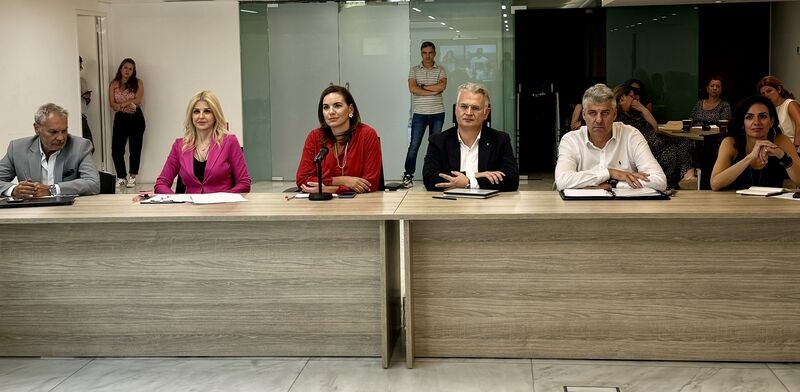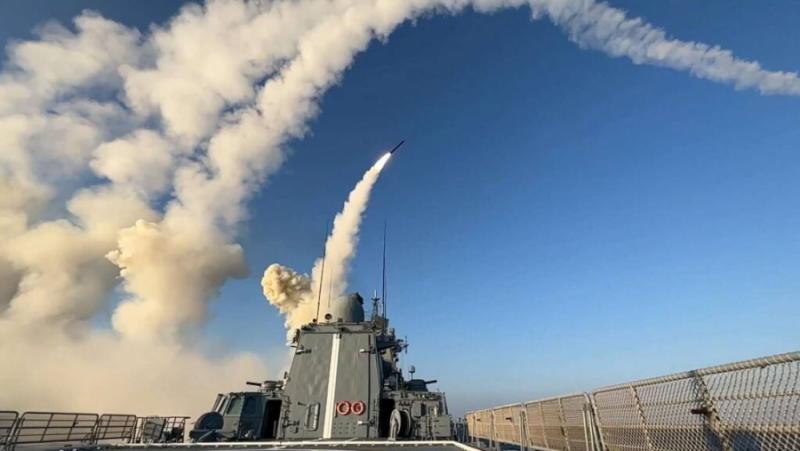One would say that after the Turkish provocations on the 50th anniversary of the Turkish invasion of Cyprus and the decisions of the Turkish Security Council on the recognition of two states, the prospect of resolving the Cyprus problem is receding. But is that the case?
“No solution is not a solution” say Athens and Nicosia together and if there is no progress in the negotiations even now, then we will definitively go to the status of no solution, that is, to partition and the creation of two states, which is what Ankara has been seeking until now.
The UN report
However, information from diplomatic sources in Athens notes that the Cyprus issue is entering a new phase and one of the key figures in the expected resumption of talks or mobility, as it is called, is the Colombian special envoy of the UN secretary general Maria Angela Holguin Cuellarwhich has prepared its report on the Cyprus issue with “fresh” ideas and proposals, as reported by the same sources.
The report has already been received by the UN Secretary General since July 10 Antonio Guterres and studies it carefully before proceeding to the next step. The Secretary-General is now considering the recommendations of Ms. Holguin’s report in order to propose next steps to the Greek Cypriot and Turkish Cypriot leaders.
In the meantime, Mrs. Holguin has come three times since her appointment to Cyprus in early February without succeeding in organizing a meeting between the two leaders, President Nikos Christodoulidis and the occupying leader Ersin Tatar.
But this does not mean that the role of Mrs. Holgin ceases to be decisive for the resumption of talks. The diplomatic work he has done so far offers the opportunity for the UN secretary-general himself to take a landmark initiative in a few weeks in September on the sidelines of the UN General Assembly, in order to initially have a joint meeting of the two leaders, a tripartite meeting that is, shortly before or after New York.
Therefore, the milestone is September and at the meeting the Prime Minister will have in New York Kyriakos Mitsotakis and the Turkish president Tayyip Erdogan. The preparation of this meeting, which will be more substantial than the one held in Washington, on the sidelines of the Summit for the 75th anniversary of the founding of NATO, is being done by the foreign ministers of the two countries George Gerapetritis and Hakan Fidan.
But what is it that opens a small window of optimism for there to be a movement in the Cyprus issue, at a time when Ankara and the occupying regime insist on the two-state solution or separate sovereignty, as they now call it, and the Turkish National Assembly passed a resolution on the international recognition of the pseudo-state?
Perhaps the most important thing is that for a year and a half there has been no tension on the field in Greek-Turkish relations. Some problems they raised (such as the case of Kasos) were resolved diplomatically and Erdogan in the occupied territories avoided threats, he did not stay to watch the fiesta of 50 warships in the occupied port of Kyrenia and beyond the attack that was launched against him Nikos Dendias he did not appear to mention the permanent Turkish positions.
Pressure from Nicosia
Athens has every reason to believe that in September Ankara will accept the resumption of dialogue on the Cyprus issue. After all, Nicosia has been pushing for several months both at the UN level and at the European Union level for there to be some mobility in relation to the resolution of the issue. Diplomatic sources in Athens also said that Ankara may this time accept that the two communities sit at the negotiating table, without preliminarily setting conditions for two separate states, however it will be the last time.
This phrase “it will be the last time”, quoted by Ankara, is definitely a kind of threat to Athens and Nicosia, because if there is no progress and the talks are interrupted, then Ankara will consider no solution as a solution with known disastrous effects.
So the “last time” will count as a new Turkish ultimatum to the Greek side? “Not necessarily”, answer experienced diplomats, who expect that after the Mitsotakis-Erdogan meeting, the UN Secretary General will ask for a tripartite conference to be convened (the leaders of the two communities, in the presence of the UN) and to cultivate the ground so that after years of stagnation in the Cyprus issue, the leaders should sit at the same table and start talking.
In essence, there will be nothing more than an overview of the situation, how we got here, why the talks stopped, what prospects there are for the future, according to Mrs. Holgin’s report. Perhaps in a second phase a five-member conference, with the participation of both guarantor powers, will be requested for the Cyprus issue. It should not be expected, of course, if the Secretary General of the UN finally proceeds to a five-day conference, that Mr. Mitsotakis and Erdogan together with the leaders of the two communities.
In all probability, the foreign ministers will be the ones who will manage the quintet from Athens and Ankara. And if something unexpected does not happen, then Mrs. Holgin can, returning to Cyprus, convene an international conference on the Cyprus issue.
The issue of bases
Finally, there are indications, again according to the estimates of diplomatic sources, that somewhat (but not completely) the Turkish obsession with two states and separate sovereignty has been bent. Perhaps at the last moment he will come up with a solution for a relaxed coexistence of the two communities, without borders, with one citizenship, instead of the other solutions that had been proposed to date and had been rejected.
And one more thing, British bases operate in Cyprus, which are sovereign British territory. In the event of a solution to the Cyprus issue (even with the prescription of “relaxed coexistence”), there are not a few in Cyprus who say that the issue of British bases will also be raised.
Casso episode
How the crisis avoidance mechanism worked
There was momentary tension off Kasos, with the surprise appearance of Turkish warships off the Dodecanese island. The Turkish ships were returning from occupied Kyrenia after Ankara’s fiesta of shame celebrations for the 50th anniversary of the Turkish invasion of Cyprus and were attempting to prevent an Italian ship from conducting searches inside the Greek EEZ.
Greek and Turkish ships found themselves facing each other again, recalling other times of crisis like the one with the “Oruc Reis”, when the fleets of the two countries went out to the Aegean and found themselves faced with rules of engagement.
This time, however, the communication channels at the diplomatic level worked, i.e. the crisis avoidance mechanism established between Athens and Ankara worked. The necessary arrangements were therefore made to complete the mission of the Italian research team without any obstacles.
It is not the first time that these crisis avoidance mechanisms are at work, especially when there is a risk of creating a hot episode or expanding the tension. The fact that for a year and a half, since last year’s earthquakes in Turkey, there have been no crises on the ground in Greek-Turkish relations and the dialogue continues, is due to the channels of communication, which Athens insisted should remain open even in difficult times of Greek-Turkish relations.
Channels of communication were open from time to time between the first diplomatic advisors of Mitsotakis and Erdogan, namely between Eleni Sourani and Ibrahim Kalin. Then with Anna-Maria Boura and Tsatai Kilic. Channels of communication also existed with Deputy Ministers Costas Fragogianni (Positive Agenda) and Alexandra Papadopoulou (Political Dialogue) with their Turkish counterpart.
The goal, as happened in Kasos, of the communication channels that the Greek and Turkish Foreign Ministries had immediately developed, was to reach agreements at various levels in order to de-escalate the crisis and decongest the area from warships. The objective was achieved according to the Ministry of Foreign Affairs.
Thus the Italian research vessel managed to travel the entire distance within the Greek EEZ. From the 6 nautical miles at the limits of Kasos, to the 6 nautical miles of Karpathos. Completed procedures and returned to Heraklion for refueling, crew change and fuel.
The tension mainly arose when Turkey wanted to prove on the ground that the Turkish-Libyan memorandum remains in force and that with this move Ankara wanted to question the validity of the demarcated Exclusive Economic Zone between Greece and Egypt, as it had been agreed and signed on August 6, 2020.
#Septembers #milestone #Cyprus #issue


